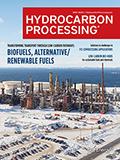
May 2024
Special Focus: Biofuels, Alternative/Renewable Fuels
The transportation fuel and chemicals sectors are facing multiple urgent challenges. They must quickly reduce their dependence on petroleum resources with cost-competitive solutions while also addressing concerns such as greenhouse gas (GHG) emissions and decarbonization.
Throughout the past decade, biofuels production has significantly increased. Some of the largest growth in the sector has been with fuels that rely on lipids, such as vegetable oils and animal fats, as feedstock. This includes biodiesel, renewable diesel and sustainable aviation fuel (SAF).
The Renewable Fuel Standard (RFS) is a regulation that requires refineries in the U.S. to output a certain percentage of their fuel from renewable sources, such as plants or animal waste. The U.S. Environmental Protection Agency (EPA) sets the minimum proportion of renewable fuel every year. The goal of the RFS is to reduce greenhouse gas emissions and dependence on fossil fuels.
Refiners are actively developing new solutions to decarbonize their finished products—such as transportation fuels or commodity chemicals—as part of the energy transition. As a result, refiners are now exploring the co-feeding of alternative feedstocks, including renewable and recyclable crude oils, as a means of lowering the carbon footprint of their products.
Process Optimization
The oil and gas industry comprises some of the most complicated manufacturing processes, involving mining, transportation, refining, distribution and retail.
Heat Transfer
In oil refineries and chemical plants, chemical reactions and separations take place in the distillation column.
Steam distribution systems are a vital part of process manufacturing because steam is a versatile means of delivering carefully controlled heat energy, usually via a heat exchanger.
Plant Design, Engineering, Construction and Commissioning
Part 1 of this article—published in the April issue —explored the importance and application of artificial intelligence (AI) techniques in the domain of advanced process design and engineering. Part 2 focuses on the use of AI for autocorrecting engineering drawings.
Refinery And Petrochemical Integration
The study of the ideal integration of an oil refinery and an ethylene production facility has regained interest due to the rising costs of crude oil and its derivatives. This study proposes a multi-objective optimization approach that maximizes the net profit and production of ethylene and propylene in an integrated plant.
Hydrogen
For more than half a century, steam methane reforming (SMR) ruled the ammonia (NH3) and hydrogen (H2) industries. Every decade since, commercial viability witnessed tremendous innovation leading to large capacity plants, new generation catalysts and equipment, operation’s reliability, energy and material efficiency, safety and environmental targets and process economics.
Digital Technologies
The oil and gas industry is facing numerous challenges that are impacting its profitability and future growth.
Columns
Around the world, nations have instituted pathways to reduce emissions within their economies. These initiatives include various investments in carbon mitigation strategies such as boosting domestic renewables capacity, utilizing low-/zero-carbon fuels for power generation (e.g., green hydrogen), adding carbon capture technologies to projects and industrial installations, and increasing bio-content in transportation fuels, among others.
Welcome to Hydrocarbon Processing’s Executive Series. In this enhanced video platform, the editors speak with the operators and technology leaders and suppliers that are optimizing the global hydrocarbon processing industry (HPI).
Plastics are some of the most vastly used materials in modern life. They are the building block of products manufactured by almost every sector, including packaging, building and construction, textiles, consumer products, transportation, electrical and electronics, and industrial machinery.
Trends and Resources
Emerson has introduced the Fisher™ easy-Drive™ 200R Electric Actuator for use on Fisher butterfly and ball valves.
Ipieca appoints ExxonMobil’s Paul Krishna as new Chair

- INEOS receives €300-million grant to rejuvenate and decarbonize its Lavera plant 2/19
- AGC Vinythai commissions expanded chlor-alkali plant and e-BiTAC electrolyzers from thyssenkrupp nucera 2/19
- BASF launches AdBlue GE (green electricity) to decarbonize mobility value chain 2/19
- Carbon Neutral Fuels select Johnson Matthey, bp and Honeywell UOP technologies for UK SAF plant 2/19
- ExxonMobil starts operations on second carbon capture project in Louisiana (U.S.) 2/19
- Pall introduces two new technologies to reduce CAPEX and TCO in oil and gas processing 2/19




